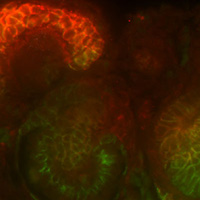 Smart Citations
Smart CitationsSee how this article has been cited at scite.ai
scite shows how a scientific paper has been cited by providing the context of the citation, a classification describing whether it supports, mentions, or contrasts the cited claim, and a label indicating in which section the citation was made.
Molecular characterization of nephron progenitors and their early epithelial derivative structures in the nephrogenic zone of the canine fetal kidney
Nephron progenitors (NPs) and nephrogenesis have been extensively studied in mice and humans and have provided insights into the mechanisms of renal development, disease and possibility of NP-based therapies. However, molecular features of NPs and their derivatives in the canine fetal kidney (CFK) remain unknown. This study was focused to characterize the expression of potential markers of canine NPs and their derivatives by immuno-fluorescence and western blot analysis. Transcription factors (TFs) SIX1 and SIX2, well-characterized human NP markers, were expressed in NPs surrounding the ureteric bud in the CFK. Canine NPs also expressed ITGA8 and NCAM1, surface markers previously used to isolate NPs from the mouse and human fetal kidneys. TF, PAX2 was detected in the ureteric bud, NPs and their derivative structures such as renal vesicle and S-shaped body. This study highlights the similarities in dog, mouse and human renal development and characterizes markers to identify canine NPs and their derivatives. These results will facilitate the isolation of canine NPs and their functional characterization to develop NP-based therapies for canine renal diseases.
Downloads
Publication Facts
Reviewer profiles N/A
Author statements
- Academic society
- N/A
- Publisher
- PAGEPress Publications, Pavia, Italy
Supporting Agencies
This research was supported by funds provided by the Tuskegee University College of Veterinary Medicine (PP), Research in principal investigator's laboratory is supported by funding from the 1SC2GM130475-01(PP) grant awarded by the National Institute of General Medical Sciences, AIA was supported by NIH/SRE 5T35OD010432How to Cite
PAGEPress has chosen to apply the Creative Commons Attribution NonCommercial 4.0 International License (CC BY-NC 4.0) to all manuscripts to be published.

 https://doi.org/10.4081/ejh.2019.3049
https://doi.org/10.4081/ejh.2019.3049






